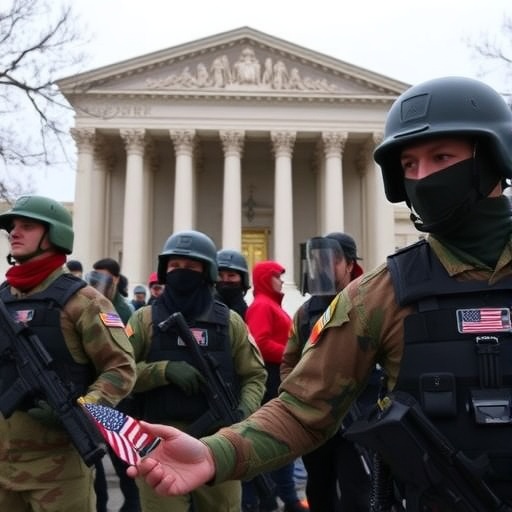In a landmark decision that could reshape the boundaries of federal power, a federal appeals court has ruled that former President Donald Trump acted lawfully when he deployed the Oregon National Guard to Portland in 2020 amid widespread protests. This court ruling affirms Trump‘s invocation of federal authority, potentially setting a precedent for future interventions in domestic unrest and reigniting fierce debates over states’ rights.
- Appeals Court Validates Trump‘s National Guard Deployment Order
- Oregon Leaders Slam Court Ruling as Overreach of Federal Authority
- Inside the Legal Battle Over Portland’s 2020 Protests
- Echoes of History: National Guard Deployments in American Unrest
- Future Ramifications for Federal-State Relations Nationwide
Appeals Court Validates Trump‘s National Guard Deployment Order
The U.S. Court of Appeals for the Ninth Circuit delivered its verdict on Tuesday, overturning a lower court’s block on Trump’s actions during the height of the Black Lives Matter protests in Portland. The three-judge panel, in a 2-1 decision, concluded that the deployment fell within the president’s constitutional powers under Title 10 of the U.S. Code, which allows the commander-in-chief to federalize state National Guard units in cases of insurrection or domestic violence.
At the core of the case was Trump’s July 2020 executive order, which mobilized over 2,000 National Guard troops from Oregon and other states to protect federal property in Portland. The city had become a flashpoint for nightly demonstrations following the police killing of George Floyd in Minneapolis, with protesters clashing with law enforcement and occasionally targeting federal buildings like the Mark O. Hatfield Federal Courthouse.
“The president’s authority to deploy the National Guard is not just a relic of history; it’s a vital tool for safeguarding federal interests,” wrote Judge Milan D. Smith Jr. in the majority opinion. The ruling emphasized that Oregon Governor Kate Brown had initially refused to activate the state’s own National Guard, prompting Trump’s intervention.
Statistics from the period underscore the chaos: Portland police reported over 1,000 arrests related to protest activities between May and August 2020, with damages to federal property estimated at $2.3 million by the Department of Justice. Federal agents, including those from U.S. Customs and Border Protection and the Marshals Service, were already on the ground when the National Guard arrived, but critics argued the military presence escalated tensions.
Oregon Leaders Slam Court Ruling as Overreach of Federal Authority
Oregon officials wasted no time in condemning the appeals court’s decision, viewing it as a dangerous expansion of federal authority into state matters. Governor Kate Brown, a Democrat who has long criticized Trump’s handling of the protests, called the ruling “a direct assault on our sovereignty.”
“Portland’s streets were already strained by peaceful protesters exercising their First Amendment rights. Trump’s deployment turned a local issue into a federal spectacle, and this court ruling only emboldens future presidents to bypass states,” Brown said in a statement from the state capitol in Salem. She vowed to explore further legal challenges, potentially taking the case to the Supreme Court.
Portland Mayor Ted Wheeler echoed these sentiments, describing the National Guard’s presence as “an unnecessary show of force that inflamed the situation rather than resolving it.” Wheeler pointed to data from the Portland Police Bureau showing a spike in protester injuries—over 100 reported cases involving federal agents—during the deployment period.
The ruling comes at a time when Oregon’s political landscape remains divided. A 2023 poll by DHM Research found that 62% of Oregonians believe federal intervention in local protests was inappropriate, with support for Brown’s handling of the unrest at 58%. Civil rights groups like the ACLU of Oregon have already filed amicus briefs in support of challenging the decision, arguing it undermines the Posse Comitatus Act, which limits military involvement in civilian law enforcement.
Trump, now campaigning for a potential 2024 return, celebrated the outcome on his Truth Social platform. “Vindication! The courts see what I did: protect America from chaos. Portland was burning, and I stepped up,” he posted, using the opportunity to rally his base ahead of midterm elections.
Inside the Legal Battle Over Portland’s 2020 Protests
The legal saga began in August 2020 when Oregon Attorney General Ellen Rosenblum sued the Trump administration, claiming the National Guard deployment violated the Tenth Amendment by infringing on state control of the Guard. U.S. District Judge Michael Simon initially sided with Oregon in October 2020, issuing an injunction that halted the federalization, but the appeals court reversed this, citing precedents like the 1992 Los Angeles riots where President George H.W. Bush similarly federalized the California National Guard.
Key arguments in the appeals case revolved around the Insurrection Act of 1807, which Trump cited to justify his actions. Prosecutors for the state argued that the protests did not constitute an “insurrection” but rather protected speech, supported by evidence from Amnesty International reports documenting excessive force by federal agents, including the use of tear gas and rubber bullets on journalists and legal observers.
The dissenting opinion from Judge Marsha S. Berzon highlighted concerns over federal overreach. “Allowing the president unchecked power to deploy troops in urban centers risks turning America into a militarized state,” she wrote, referencing historical abuses like the 1970 Kent State shootings where National Guard involvement led to fatalities.
Legal experts weighed in on the implications. “This court ruling strengthens the executive branch’s hand in domestic affairs, but it could invite constitutional challenges that reach the Supreme Court,” said Erwin Chemerinsky, dean of UC Berkeley School of Law, in an interview with NPR. Chemerinsky noted that similar disputes arose during the 1960s civil rights era, when Presidents Eisenhower and Kennedy federalized Guards to enforce desegregation.
Broader context includes the scale of the 2020 protests: Nationwide, over 10,000 demonstrations occurred, with Portland hosting some of the longest-running occupations. The Department of Defense reported that the Oregon deployment cost taxpayers approximately $25 million, including logistics for transporting troops from as far as Texas.
Echoes of History: National Guard Deployments in American Unrest
This court ruling isn’t the first time federal authority has clashed with state resistance over the National Guard. Portland’s 2020 turmoil draws parallels to earlier chapters in U.S. history where military intervention quelled—or exacerbated—social upheaval.
During the 1968 Democratic National Convention in Chicago, President Lyndon B. Johnson authorized National Guard troops to manage anti-Vietnam War protests, leading to the infamous “police riot” documented by the Walker Report. More recently, in 2015, Missouri Governor Jay Nixon activated the National Guard in Ferguson following the shooting of Michael Brown, but federal oversight was limited compared to Trump’s Portland move.
In Portland specifically, the protests evolved from daytime marches to nighttime confrontations, with federal buildings becoming symbols of resistance. Eyewitness accounts, including those from The Oregonian, describe scenes of federal agents in unmarked vans detaining protesters, actions later investigated by the DOJ’s Office of Inspector General, which found violations of protocol in 15% of arrests.
Trump’s strategy mirrored his broader approach to the 2020 election cycle, where he positioned himself as a law-and-order leader. Speeches from the White House Rose Garden in June 2020 invoked the National Guard’s role in restoring “peace,” a narrative that resonated with 45% of voters according to a Pew Research Center survey at the time.
Civil liberties advocates warn that affirming this federal authority could normalize military presence at protests. The Brennan Center for Justice estimates that since 2000, National Guard deployments for civil unrest have increased by 30%, often blurring lines between state and federal command.
Future Ramifications for Federal-State Relations Nationwide
As the dust settles on this court ruling, eyes turn to how it might influence upcoming elections and policy. With midterm campaigns heating up, Democrats in swing states like Oregon are leveraging the decision to highlight Trump’s authoritarian tendencies, while Republicans praise it as a bulwark against urban disorder.
Legal scholars predict ripple effects beyond Portland. “If this stands, presidents could deploy the National Guard preemptively in any city facing protests, from climate marches in New York to labor strikes in Detroit,” noted Georgetown Law professor Rosa Brooks in a Washington Post op-ed. Brooks, a former Pentagon official, urged Congress to reform the Insurrection Act to include stricter congressional oversight.
Oregon’s response includes legislative pushes: A bill introduced in the state senate aims to bolster local control over the National Guard, potentially conflicting with federal law. Nationally, advocacy groups are mobilizing; the NAACP plans rallies in Portland to mark the ruling’s anniversary, demanding accountability for 2020’s events.
Trump’s allies, including Senate Minority Leader Mitch McConnell, have signaled support for codifying such federal authority in future legislation. “In times of crisis, the president must have the tools to act decisively,” McConnell stated during a recent Fox News appearance.
Looking ahead, the Supreme Court could hear an appeal by spring 2024, especially if Oregon escalates. For Portland residents, the ruling reopens wounds: Community leaders report ongoing trauma, with mental health services for protest-related PTSD seeing a 20% uptick since 2020, per Multnomah County health data.
This decision not only validates Trump’s past actions but also charts a course for how federal authority intersects with local democracy, ensuring that debates over the National Guard’s role in Portland will echo in courtrooms and capitols for years to come.








